for·ward /ˈfɔrwərd/
adverb
- toward the future

In this section we’ll examine what we can all do to reduce and eliminate racism on an individual and institutional level.
Reconciling the Truth
As we talked about in the Roots of Racism section, The Truth and Reconciliation Commission of Canada was created to examine how to restore the relationship with First Nations after the devastation of residential schools.
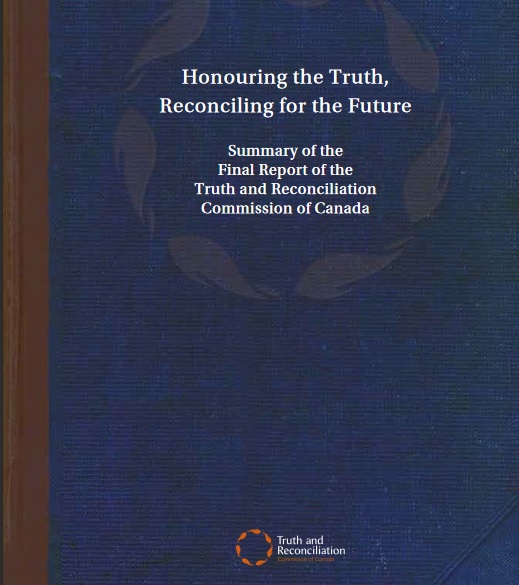
The report acknowledges that reconciliation is going to be a long and hard road because of Canada’s long history of mistreating Aboriginal citizens. It states that it’s important not just to resolve current conflicts between people across the country, but also that Canada can make up for its mistakes as a nation, and move forward, hoping that one day, it can truthfully claim to be a leader of human rights among all its citizens.
In 2016 a Canada-wide survey was done to observe how relations between Canadas Indigenous peoples and Canadians have grown and changed.
Of the people surveyed 58% of Canadians believed that Indigenous history and culture were very important in defining Canada. In 2009 only 45% had this view. A growing majority of non-Aboriginal Canadians acknowledged the challenges that Aboriginal people face on a systemic level, mainly in the education and justice systems, at least to some level.
66% of non-Aboriginal people had heard or read about residential schools and 73% recognized their impact on the obstacles facing Aboriginal peoples.
Although only 42% had heard or read about the Truth and Reconciliation Commission, a strong majority supported Aboriginal rights and increased funding for Aboriginal education, clean drinking water, and proper housing on reserves.
Sandra Inutiq talks about 21 ways to improve the relationship with Inuit peoples. She says,
“For those interested in changing this state of affairs, here are ways that maybe you can be a better white person, or may I suggest, an ally.”
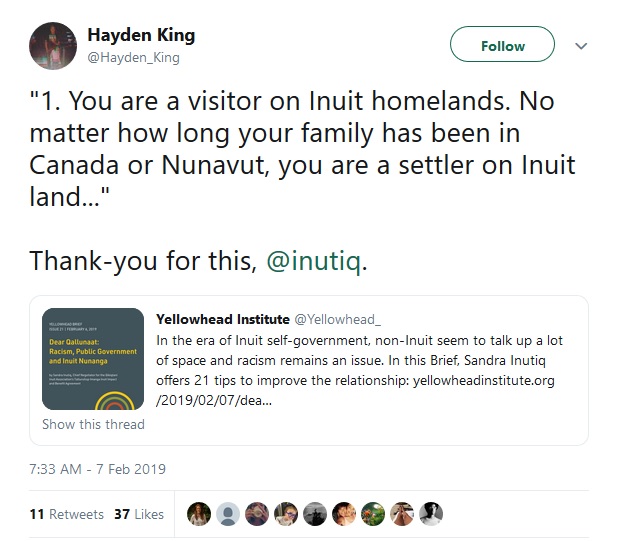
Indigenous Education Protocol
The Indigenous Education protocol was a document created by Colleges and Institutes Canada who worked with members of the Indigenous community. The protocol underlines what institutions must do to fulfill Indigenous education needs and provide support. The protocol is driven on seven principles that will be a guide for institutions that agree and sign the document. The seven principles and more information on the Indigenous Education Protocol can be found on this website.
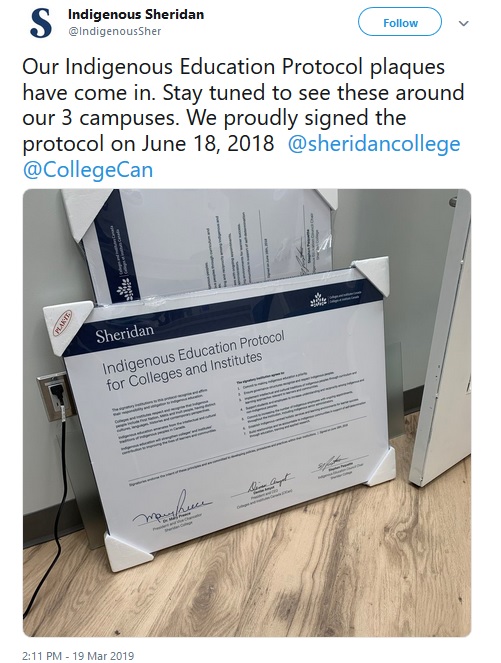
Media
Media has the ability to make a difference by uncovering Indigenous issues, but they need to improve on how Indigenous stories are brought to everyone’s attention.
Hayden King, Gchi’mnissing Anishinaabe educator/writer and the director of the Centre of Indigenous Governance at Ryerson University, says media need to do a better job of holding power accountable, especially on Indigenous issues. Hear more of what King has to say in the clip below.
Rogers opens Downie-Wenjack Legacy Space
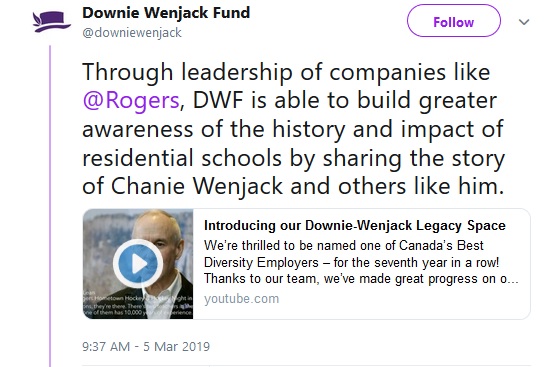
Rogers partnered with the Downie-Wenjack Fund to open a new Indigenous Legacy space. City News said,
“The space is designed to recognize Indigenous history and encourage conversations on the road to Reconciliation.”
The legacy space creates opportunities for everyone to learn about Indigenous cultures with work from Indigenous artists, books of history, and artifacts. It’s located in Toronto at Rogers Communications.

White Nonsense Round-Up
With many acts of racism and prejudice still taking place there are some people who are stepping up to fight this problem and effect change. White Nonsense is a group of Caucasian individuals who take on the responsibility of breaking down and explaining why things are racist.
You can tag White Nonsense on social media to identify posts that could be racist and get an explanation of why a comment or post is offensive. Click here to view their Facebook page, where you can also find information on how to contact them regarding a post.
Social Media Changes
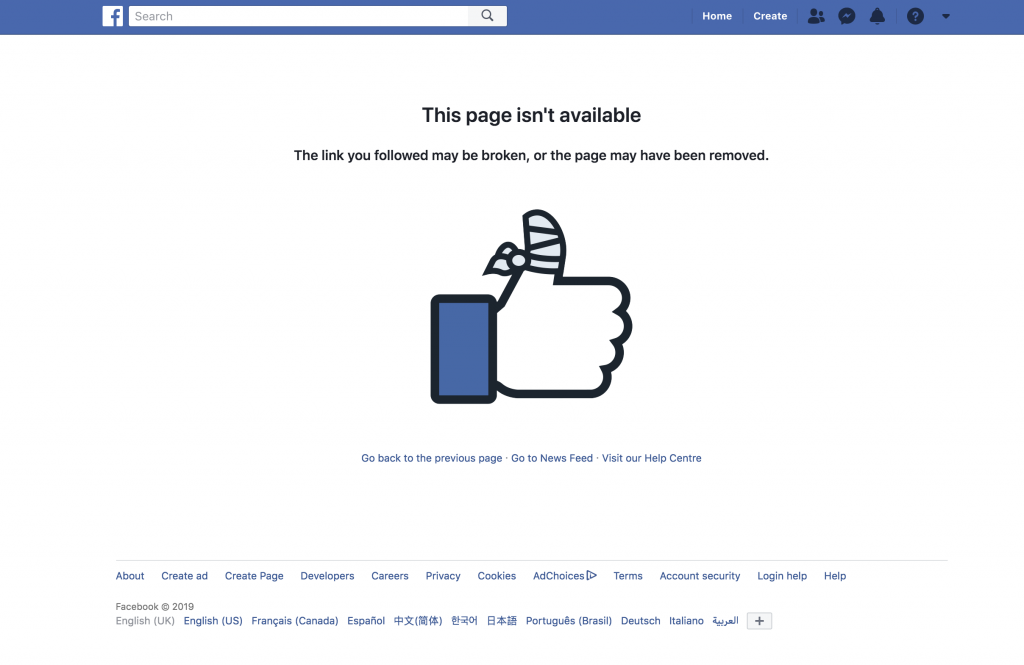
After facing years of criticism, Facebook is making changes to fight back against racism and hatred. It has announced it will no longer give white nationalism and separatism a platform for hate speech. People who search for specific key terms for hate groups within Facebook will also be redirected to an organization called “Life after Hate” which helps people leave a hate-filled life behind. Facebook who also owns Instagram has already banned a few accounts including Kevin Goudreau and Faith Goldy for prohibition of “organized hate.” Faith Goldy was a mayoral candidate in Toronto.
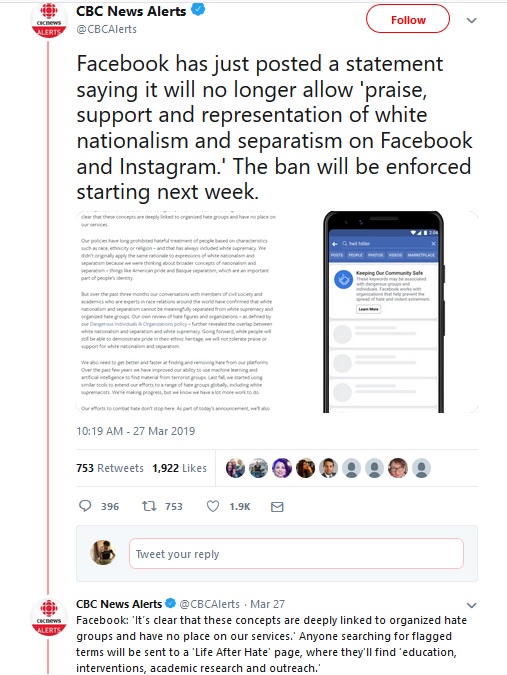
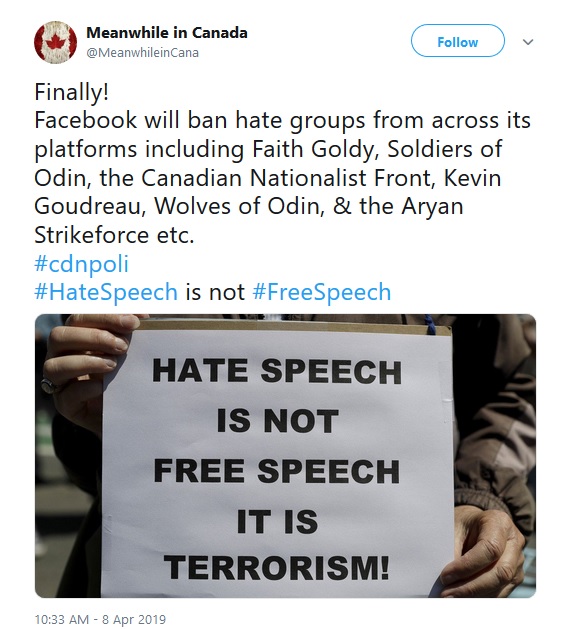
Although Facebook and Instagram have banned Goldy’s accounts she is still present on Twitter. Twitter hasn’t taken any action to ban her account despite having a hateful conduct policy.
Twitter’s Hateful conduct policy deals with tweets that are deemed hate speech or threats by deleting the user’s tweets and setting their accounts into “read only mode,” which doesn’t allow them to post new tweets for a period of time. Further violations lead to longer read-only periods and eventual permanent account suspension.
Youtube also has a hate speech policy, which removes content. The user is emailed to let them know they’ve broken the rules. If the policy is violated three times the user’s channel is terminated, which has happened to sites like Infowars, or ones that try to share Infowars content.
Suspending Halifax street checks
As we were working on this project, Halifax Police voted in favour of suspending street checks and issuing a formal apology. However, this is only a suspension, not a ban. Issac Saney, a Black professor at Dalhousie University, says a ban would acknowledge the extreme human rights violation of street checks in the Black community and the “definite colour line in Halifax.”
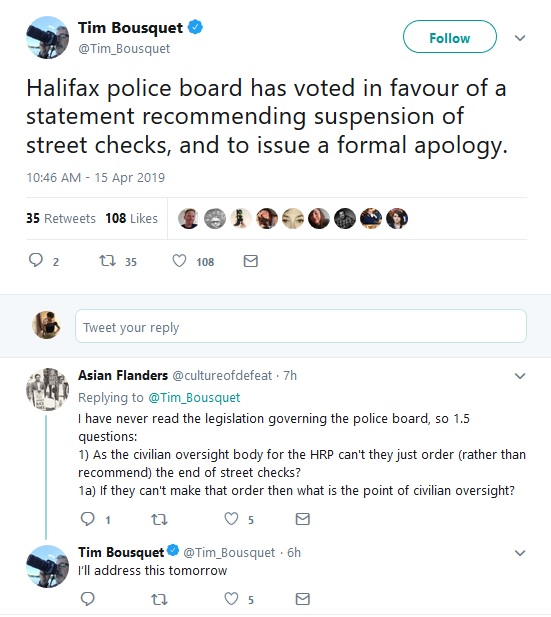
Views on Immigration
The Pew Research Center conducted a survey on 18 countries that are homes to the most immigrants around the world. The survey asked residents of each country if immigrants are a burden or make the country stronger. The results of the 2018 survey showed that Canada was at the top of the list with the highest percentage of people believing immigrants make our country stronger.
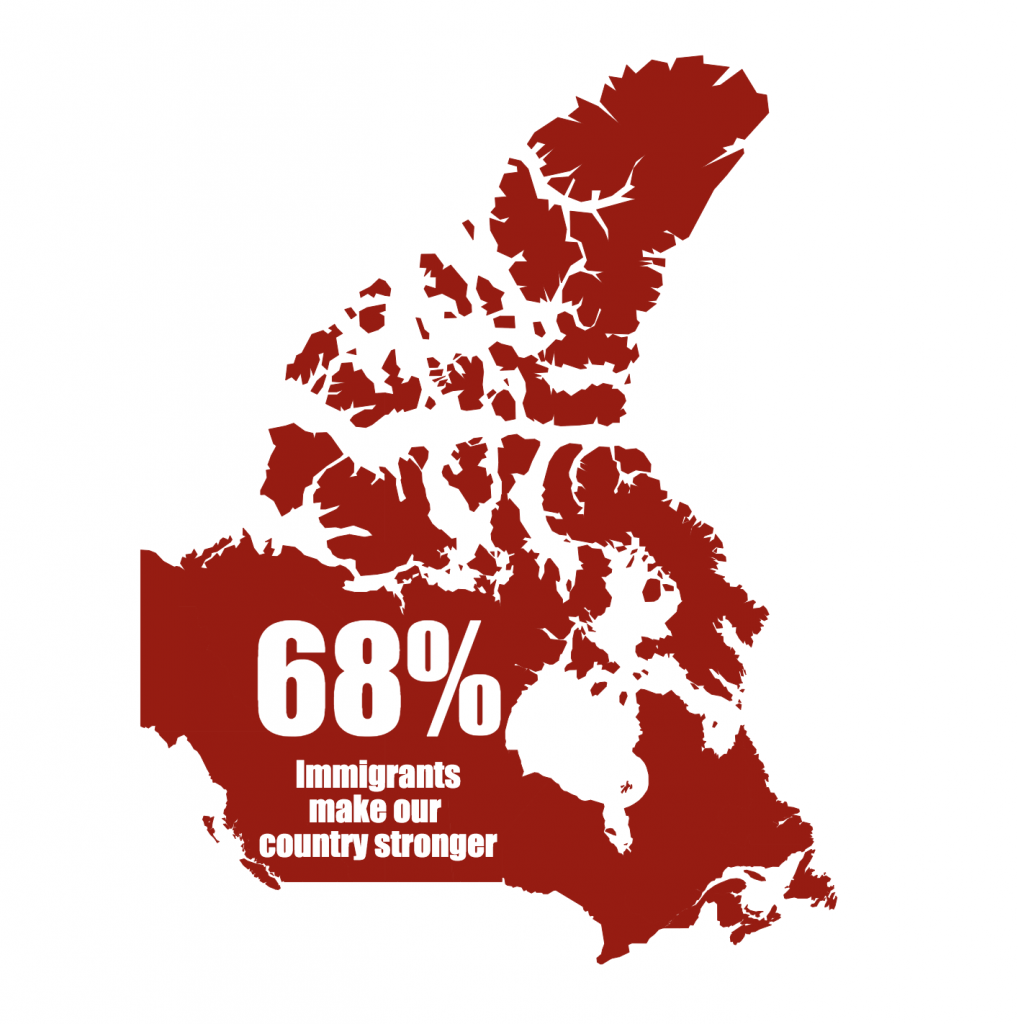
However, a Canadian study released in the same timeframe found racist attitudes towards doctors with foreign accents–they were seen as less competent.
Canada’s federal government is planning a new anti-racism strategy but critics say it should be more open. Invite-only meetings have taken place in several cities including Halifax, Montreal, Toronto, Thunder Bay, Calgary, Vancouver, and Iqaluit. The Department of Heritage has been in charge of developing the strategy to reduce and eliminate racism and discrimination in Canada. NDP MP Jenny Kwan has raised concern over the secrecy and invite-only process of developing the strategy. In a Huffpost article she says,
“We don’t even know what was discussed behind closed doors on this consultation process.”
She wants know more about how the government is utilizing the budget and where the money is going.
What can you do?
Some people don’t commit acts of discrimination or prejudice, but don’t take any action when they witness others doing it. An important part of recognizing and fighting discrimination is using you voice against it. When you witness someone being mistreated, do what you can to help them in that situation. The Twitter post below is an eyeopener for what a bystander can do to help a victim of Islamophobic harassment. However, this could be a guideline for any type of discrimination you witness.
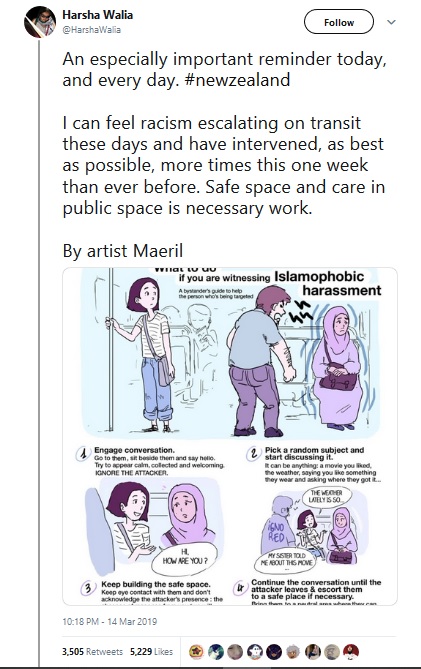
Holding Space
Composer and musicologist Jeremy Dutcher won the 2019 Juno for Indigenous music album of the year for “Wolastoqiyik Lintuwakonawa”. While Dutcher was giving his speech about Reconciliation music started playing cutting him off and pushing him off the stage. Later on in the evening when the Arkells won the rock album of the year award, rather than giving a speech Max Kerman (Arkells) invited Dutcher back to the stage to finish up his speech. When he returned to the stage, Dutcher said,
“This is what holding space looks like.”
Reporter Davis Plett wrote about “holding space” in the Uniter. Plett wrote,
“Colonialism is fundamentally a form of violence against space and those who inhabit it. Dutcher’s choice of words – “holding space” – evokes a different kind of relationship: holding space as a pause; holding space as a gentle gesture; holding space as reserving something for someone else.”
Becoming an Ally
Michaelann George, professor and program coordinator at Sheridan college, shared some ideas on how we can break away from racial stereotypes, discrimination, and prejudice.
Many people don’t see connections between different levels of oppression or know how it operates. In Becoming an Ally Breaking the Cycle of Oppression, Anne Bishop talks about 18 principles of how to be an ally, provide support, and respect the experience of those who deal with racism. The graphic below summarizes the principles.
Bilal Dawson, a well-known YouTuber, Adrian Wallace, Creative Director at ELMNT FM, and spoken-word poet Britta Badour, shared their thoughts on solutions to racism. Although it’s a big question, they told us what everyone can do, on an individual level, to make a difference in society.
Conclusion
Racism is tough to talk about. What is racism? How do you bring it up in conversation? How do you address it when you see it? What words hurt?

As a class we struggled to tackle this topic. How could we possibly take such a divisive and systemic issue and explain the overwhelming amount of information about it on one website? We realised we couldn’t. What we could do is try to identify where racism comes from, where it still lives, and shed light on some areas we believe lead to the most polarization.
Racism isn’t as apparent as many believe, often it’s embedded in larger social structures. Systemic racism is something that grows inside of uneducated and uncultured businesses, schools, and cities. People learn from experiences– if they witness that racist actions are acceptable in their culture they can easily follow in another’s footsteps. It takes a strong individual to go against the flow of society.
We believe that with knowledge comes understanding and that forgiveness is important. People aren’t responsible for their ancestors’ actions but we shouldn’t ignore that the mistakes of the past still impact our society.